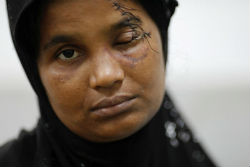
YANGON: Myanmar's military admitted its soldiers had murdered 10 captured Muslim "terrorists" during insurgent attacks at the beginning of September, after Buddhist villagers had forced the captured men into a grave they had dug.
"Villagers and members of the security forces have confessed that they committed murder," the military said in a statement on Wednesday.
It was a rare admission of wrongdoing by the Myanmar military during its operations in the western state of Rakhine.
The army launched a sweeping counteroffensive in the north of the state in response to Rohingya militant attacks on Aug 25, triggering an exodus of more than 650,000 Rohingya Muslim villagers.

A Rohingya child cries on his mother's lap while suffering from severe malnutrition in the Balukhali camp in Cox's Bazar, Bangladesh Oct 5, 2017. (Reuters file photo)
The international aid group Doctors Without Borders estimates that at least 6700 Rohingya – including at least 730 children under the age of 5 - were killed in the first month of the crackdown.
“The numbers of deaths are likely to be an underestimation, as we have not surveyed all refugee settlements in Bangladesh and because the surveys don’t account for the families who never made it out of Myanmar,” Dr Sidney Wong, MSF’s medical director, said previously.
Of the deaths, 69% were shot, with others burned and beaten to death. Wong said “We heard reports of entire families who perished after they were locked inside their homes, while they were set alight.”
The United Nations has condemned the army's campaign as ethnic cleansing. Myanmar denies that, saying its forces were carrying out legitimate counterinsurgency operations.
Myanmar admits existence of mass grave of Rohingya for the first time as its army says security forces took part in massacre of 10 Rohinyga in village in Rakhine state https://t.co/o7ZswDIzjc pic.twitter.com/7YDO2NRx6F — TRT World (@trtworld) January 10, 2018
(Video Twitter/TRT World)
The military announced on Dec 18 that a mass grave containing 10 bodies had been found at the coastal village of Inn Din, about 50km north of the state capital Sittwe. The army appointed a senior officer to investigate.
The military said on Wednesday its investigation had found that members of the security forces had killed the 10 and that action would be taken against them.
Security forces had been conducting a "clearance operation" in the area on Sept 1 when "200 Bengali terrorists attacked using sticks and swords", the military said in a statement posted on the Facebook page of its commander-in-chief, Senior General Min Aung Hlaing.
The military refers to members of the Rohingya Muslim minority as "Bengalis", a term the Rohingya reject as implying they are illegal migrants from Bangladesh.

A burnt house is seen in a village in Maungdaw in the north of Rakhine state in Myanmar, Sept 12, 2017. (Reuters file photo)
Ten of the attackers were captured after the security forces drove the rest off by firing into the air, according to the statement on Facebook, which the military often uses to make announcements.
The captives should have been handed over to the police, in line with procedure, but the militants were attacking "continuously" and had destroyed two military vehicles with explosives, it said.
"It was found that there were no conditions to transfer the 10 Bengali terrorists to the police station and so it was decided to kill them," the military said, referring to the findings of the investigating team.

Gultaz Begum, who said she fled from Myanmar with her seven children after she was shot in the eye, her husband killed and village burnt, rests at the ward for Rohingya refugees in Sadar hospital in Cox's Bazar, Bangladesh Sept 28, 2017. (Reuters file photo)
Angry ethnic Rakhine Buddhist villagers, who had lost relatives in militant attacks, wanted to kill the captives, and stabbed them after forcing them into a grave on the outskirts of the village. Then members of the security forces shot them dead, the military said.
"Action will be taken against the villagers ... and the security force members who violated the rules of engagement according to the law," the statement said.
Action would also be taken against those who had failed to report the incident to their seniors, and those responsible for supervising the operation, it added.
The military investigation was led by Lieutenant General Aye Win. The same officer had been in charge of a wider probe into the conduct of troops in the conflict that concluded in a report in November that no atrocities had taken place.
The rights group Amnesty International said the statement from the military was "a sharp departure from the army’s policy of blanket denial of any wrongdoing".
"However, it is only the tip of the iceberg and warrants serious independent investigation into what other atrocities were committed amid the ethnic cleansing campaign that has forced out more than 655,000 Rohingya," the rights group said in a statement.
- Earlier report: Myanmar military admits mass murder of Rohingya
- Related video: Myanmar prosecutor seeks charges against Reuters reporters